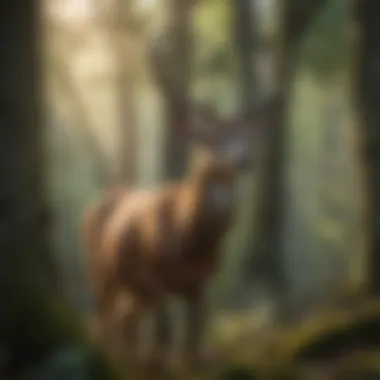Discover Exciting Outdoor Career Paths for Nature Enthusiasts


Evergreen Trees Species
Evergreen trees, a staple of American forests, encompass a wide array of species contributing to the rich biodiversity of the natural landscape. From the majestic towering Douglas firs to the resilient Eastern red cedars, these evergreen giants play a crucial role in shaping the ecosystem. Delving into the nuances of different species, one can unravel the unique characteristics and habitats that these trees thrive in, providing a deeper understanding of their ecological significance.
Ecological Significance
The ecological importance of evergreen trees transcends mere aesthetics; these stalwart beings serve as pillars of environmental stability. From providing year-round shelter for wildlife to purifying the air through photosynthesis, their impact resonates across diverse habitats. By examining the intricate relationships between evergreen trees and their ecosystems, one can grasp the intricate web of life that relies on their presence for sustenance and balance.
Conservation Practices
To safeguard the future of evergreen tree species, conservation practices play a pivotal role in ensuring their longevity. Through the implementation of sustainable harvesting methods, reforestation initiatives, and habitat protection measures, conservationists strive to preserve the delicate equilibrium of forest ecosystems. By shedding light on effective conservation strategies, we can reinforce the importance of safeguarding these invaluable natural resources for generations to come.
Stay tuned for Forest Management Techniques in our next section.
Foreword
Outdoor job opportunities present a gateway to a fulfilling and impactful career for individuals passionate about nature, the environment, and outdoor exploration. This section aims to shed light on the diverse array of professions available in nature-related fields, catering to those looking to merge their love for the outdoors with their professional aspirations.
Understanding Outdoor Job Opportunities
Benefits of Outdoor Careers
Embracing outdoor careers offers not just a job but a lifestyle enriched by the closeness to nature. The allure of working amidst scenic landscapes, wildlife, and forests brings a sense of purpose and connection with the environment. This section will delve into the intrinsic rewards and tangible benefits that outdoor careers provide, highlighting the unique opportunity they offer to blend passion with profession.
Types of Outdoor Jobs
Exploring the various types of outdoor jobs unveils a spectrum of possibilities for individuals seeking unconventional and nature-immersed vocations. From roles in forestry to wildlife conservation, each job type comes with its distinctive characteristics and responsibilities. Understanding the diverse options available empowers enthusiasts to align their skills and interests with a career that resonates deeply with their values and ambitions.
Importance of Nature-Related Professions
Nature-related professions play a pivotal role in promoting environmental stewardship and conservation efforts. By immersing professionals in direct contact with the natural world, these careers instill a profound appreciation for biodiversity and ecosystem health. This section illuminates the significance of nature-related professions in safeguarding our planet's ecological balance and underscores the importance of preserving natural resources through sustainable practices.
Forestry Careers


Forestry careers, a pivotal aspect of this comprehensive article, play a significant role in connecting individuals with nature and sustainable resources. These careers offer a blend of outdoor work, environmental conservation, and resource management, making them a prime choice for those passionate about the outdoors. Forestry professionals engage in activities like tree management, forest conservation, and monitoring ecosystem health, contributing directly to the preservation of natural habitats and biodiversity.
1.1. Forester
Responsibilities
Foresters shoulder the critical responsibility of overseeing and implementing forest management plans to ensure the sustainable use of forest resources. Their core duties include conducting forest inventories, monitoring wildlife populations, managing timber harvesting activities, and collaborating with stakeholders to promote sustainable land use practices. The unique feature of a forester’s responsibilities lies in their direct impact on forest ecosystems and conservation efforts, making it a rewarding career choice within this article.
Qualifications
Entry into the field of forestry typically requires a bachelor's degree in forestry, environmental science, or a related field. Specialized knowledge in forest ecology, wildlife management, and land conservation is essential for success in this role. Possessing strong analytical skills, communication abilities, and a deep-rooted passion for nature are key characteristics that set apart qualified foresters for their contribution to forestry careers.
Salary Range
Foresters' salaries vary based on experience, education, and job location. Entry-level positions may range from $40,000 - $60,000 annually, while experienced foresters or those in supervisory roles can earn upwards of $80,000. The salary range reflects the level of expertise and responsibility involved in managing and conserving forest resources, making it a competitive and fulfilling career path within this article.
Wildlife Conservation Jobs
In this section, we delve into the critical realm of Wildlife Conservation Jobs, a field of utmost importance in today's environmental landscape. Wildlife Conservation Jobs play a vital role in preserving ecosystems, protecting endangered species, and maintaining biodiversity. Professionals in this field contribute significantly to the mitigation of human-wildlife conflicts and the development of sustainable conservation practices. The impact of Wildlife Conservation Jobs extends far beyond individual species, influencing entire habitats and ecological balances. As our planet faces unprecedented challenges in wildlife protection, the need for skilled and passionate individuals in Wildlife Conservation Jobs has never been more pressing.
Wildlife Biologist
Job Description
The role of a Wildlife Biologist is multifaceted, involving the study and management of wildlife populations and their habitats. Wildlife Biologists conduct field research, collect data on animal behavior, and analyze ecological systems to develop conservation strategies. Their work focuses on understanding the impact of human activities on wildlife and implementing measures to promote coexistence and preservation. Wildlife Biologists play a crucial role in species preservation, habitat restoration, and the development of wildlife management plans.
Qualifications
Becoming a Wildlife Biologist typically requires a bachelor's degree in wildlife biology, ecology, zoology, or a related field. Advanced positions or research roles may necessitate a master's or doctoral degree. Strong analytical skills, fieldwork experience, and knowledge of environmental regulations are key qualifications for this profession. Wildlife Biologists often possess a deep passion for conservation and a commitment to protecting the natural world.
Career Prospects
Careers in Wildlife Biology offer diverse opportunities in research institutions, government agencies, non-profit organizations, and consulting firms. With growing concerns about biodiversity loss and habitat degradation, the demand for Wildlife Biologists is projected to increase. Job prospects are promising for individuals interested in wildlife conservation, environmental advocacy, and scientific research. Wildlife Biologists have the chance to make tangible contributions to species preservation and environmental sustainability.


Park Ranger
Responsibilities
Park Rangers are responsible for overseeing and protecting natural resources in parks, forests, and wildlife reserves. They enforce park regulations, provide visitor assistance, and conduct ecological monitoring to ensure the well-being of wildlife and ecosystems. Park Rangers also engage in educational programs to promote environmental awareness and conservation practices among park visitors.
Training Needed
Becoming a Park Ranger typically requires a combination of formal education and practical experience. Many positions prefer candidates with a degree in environmental science, forestry, park management, or a related field. Additionally, specialized training in law enforcement, first aid, and wilderness survival may be necessary. Park Rangers often undergo rigorous training to handle emergency situations and wildlife encounters effectively.
Salary Information
The salary for Park Rangers varies depending on the location, level of experience, and type of employer. Entry-level positions may start at a modest salary but offer opportunities for advancement and salary increases with tenure. Park Rangers employed by government agencies or national parks tend to receive competitive benefits packages, including healthcare, retirement plans, and accommodation options.
Wildlife Rehabilitator
Tasks
Wildlife Rehabilitators focus on caring for injured, orphaned, or sick animals with the goal of releasing them back into their natural habitats. They provide medical treatment, rehabilitation services, and temporary housing for wildlife in need. Wildlife Rehabilitators collaborate with veterinarians, biologists, and conservationists to ensure the proper care and welfare of animals under their supervision.
Requirements
Becoming a Wildlife Rehabilitator requires a combination of education, experience, and licensing. Wildlife Rehabilitators typically have backgrounds in biology, animal science, veterinary medicine, or a related field. Hands-on experience with wildlife handling and rehabilitation techniques is crucial for practicing as a Wildlife Rehabilitator. Obtaining state permits or certifications may be necessary to legally rehabilitate wildlife in certain regions.
Challenges and Rewards
The field of Wildlife Rehabilitation comes with inherent challenges, including emotional stress from dealing with injured animals and the demanding nature of the work. However, the rewards of seeing animals recover and return to their natural habitats outweigh the challenges. Wildlife Rehabilitators experience a deep sense of fulfillment in contributing to wildlife conservation efforts and making a tangible difference in the lives of individual animals.
Environmental Education Careers
Within the realm of Outdoor Job Ideas, Environmental Education Careers play a pivotal role. These careers are not merely about conveying information but are essential in cultivating a deep respect and understanding of nature. Individuals embarking on this path serve as catalysts for instilling environmental awareness and conservation values in diverse audiences. Their role goes beyond conventional teaching to foster a profound connection with the natural world. By engaging learners of all ages in outdoor activities and informative sessions, Environmental Educators nurture a generation that appreciates and safeguards our planet.
3.1. Environmental Educator


Job Responsibilities: Environmental Educators shoulder the crucial responsibility of educating individuals on environmental issues, sustainability practices, and ecosystem conservation. They design and implement engaging programs that promote environmental stewardship and inspire positive behavior change. A key characteristic of this role is the ability to communicate complex concepts in a simple and actionable manner, making environmental education accessible and compelling. Their unique feature lies in their capacity to ignite a passion for nature and conservation in their students, thereby driving tangible environmental impact through knowledge dissemination.
Educational Background: An educational background in environmental science, education, or a related field is imperative for aspiring Environmental Educators. This foundation equips them with the necessary knowledge to communicate effectively and inspire environmental action. Understanding the interplay between humans and the environment, coupled with effective communication skills, forms the cornerstone of their educational background. This background empowers Environmental Educators to tailor their messages to resonate with diverse audiences, thereby maximizing their educational outreach.
Impact on Conservation Efforts: The impact of Environmental Educators on conservation efforts cannot be overstated. By instilling a sense of environmental responsibility and stewardship in individuals, they contribute significantly to conservation initiatives. Their ability to convey the importance of biodiversity, ecosystem services, and sustainable practices directly influences public attitudes and behaviors towards environmental protection. Through their work, Environmental Educators inspire the next generation of environmental leaders and advocates, shaping a more environmentally conscious society.
3.2. Nature Interpreter
Role: Nature Interpreters play a vital role in bridging the gap between people and the natural world. They act as storytelling guides, unraveling the mysteries of flora and fauna through engaging narratives and interactive experiences. A key characteristic of their role is the innate ability to connect with audiences of all backgrounds, fostering a deep appreciation for the intricacies of nature. By transforming complex ecological processes into relatable stories, Nature Interpreters evoke a sense of wonder and curiosity, prompting a deeper understanding of the environment.
Skills Required: The role of a Nature Interpreter demands a blend of communication skills, scientific knowledge, and creativity. Proficiency in storytelling, public speaking, and environmental interpretation is essential for effectively conveying ecological concepts to diverse audiences. Their ability to communicate scientific information in an engaging and accessible manner sets them apart. Nature Interpreters possess a unique skill set that enables them to inspire awe and appreciation for nature while fostering a sense of environmental stewardship in their listeners.
Engagement Techniques: Nature Interpreters employ a variety of engagement techniques to immerse audiences in the natural world. From guided hikes and interactive demonstrations to interpretive programs and live demonstrations, they utilize diverse strategies to captivate and educate. Their key characteristic lies in the ability to tailor engagement techniques to different audiences, ensuring an enriching experience for participants. By creating interactive and memorable encounters with nature, Nature Interpreters sow the seeds of environmental awareness and conservation amongst their listeners.
3.3. Outdoor Education Instructor
Tasks: Outdoor Education Instructors undertake a multifaceted role that involves facilitating outdoor learning experiences, promoting environmental literacy, and instilling a sense of environmental responsibility. Their tasks encompass designing outdoor curriculum, leading field trips, and conducting hands-on activities that foster a deeper connection with nature. A key characteristic of their role is the hands-on approach to learning, emphasizing experiential education as a powerful tool for environmental awareness. Their unique feature lies in creating transformative outdoor experiences that empower individuals to become active stewards of the environment.
Training: To excel as an Outdoor Education Instructor, a comprehensive training program is essential. This training typically covers outdoor leadership, environmental interpretation, risk management, and curriculum development. Equipped with hands-on learning experiences and outdoor skills, instructors are prepared to guide participants safely through outdoor environments while imparting valuable environmental knowledge. Their training instills confidence in navigating outdoor settings and facilitates effective communication of ecological concepts in an outdoor classroom setting.
Benefits of Working in Outdoor Education: The allure of working in outdoor education lies in the opportunity to inspire environmental consciousness and facilitate meaningful connections with the natural world. Outdoor Education Instructors derive satisfaction from witnessing the transformation of participants as they develop a profound appreciation for nature. The unique feature of this career path is the ability to create lasting impacts on individuals' attitudes towards the environment, fostering a sense of environmental commitment and fostering a desire to protect the natural world.
Finale
In the bustling world of outdoor job opportunities, the Conclusion segment holds paramount significance, serving as the compass steering individuals towards fulfilling and gratifying careers entwined with nature's essence. As the final chapter of this comprehensive guide, it encapsulates the vital essence of making considered choices, emphasizing craftsmanship aspects varying from heritage preservation to ecological stewardship are explored. Driving the narrative towards a mindful closure, it beckons readers to reflect on the apex significance of their contribution to environmental. By delving deep (deept) into pivotal elements, benefits, and considerations revolving around the Closing section, this article serves as a guiding beacon for those seeking vocational paths intertwined with the great outdoors.
Pursuing Your Passion for the Outdoors
Exploring Opportunities
Unveiling the chapter on [Exploring Opportunities](Exploring Opportunities), we unravel the veritable treasure trove nestled within outdoor vocational spheres a fine tapestry for individuals yearning to weave their career journey with nature's threads. This unique facet exemplifies the myriad paths individuals can traverse in diverse environments, resonating with spirited nature-enthusiasts worldwide. The intrinsic allure of Exploring Opportunities lies in its capacity to seamlessly integrate passion (psssion) with profession.
Making Informed Career Choices
Moving towards the realm of [Making Informed Career Choices](Making Informed Career Choices), the narrative takes strides towards enlightening readers on the nuanced decision-making process underpinning success in outdoor vocations. Delving into the fabric of every option, it accentuates the essence of astute choice architecture upheld by wisdom passed down through generations. Making Informed Career Choices resonates with a melodic harmony extracted from the precision of informed decision-making.
Impact of Outdoor Jobs on Conservation
Within the [Impact of Outdoor Jobs on Conservation](Impact of Outdoor Jobs on Conservation) orbit, we unearth the transformative force pulsating through the core of nature-oriented professions. Delving past conventional paradigms, this segment peels back layers to reveal the profound synergy between outdoor vocations and conservation dogmas. Upholding the mantle of environmental guardianship, professions within this realm cast ripples that reverberate cartoons Mario through the tapestry of wildlife preservation and ecological equilibrium eneresh tensions



